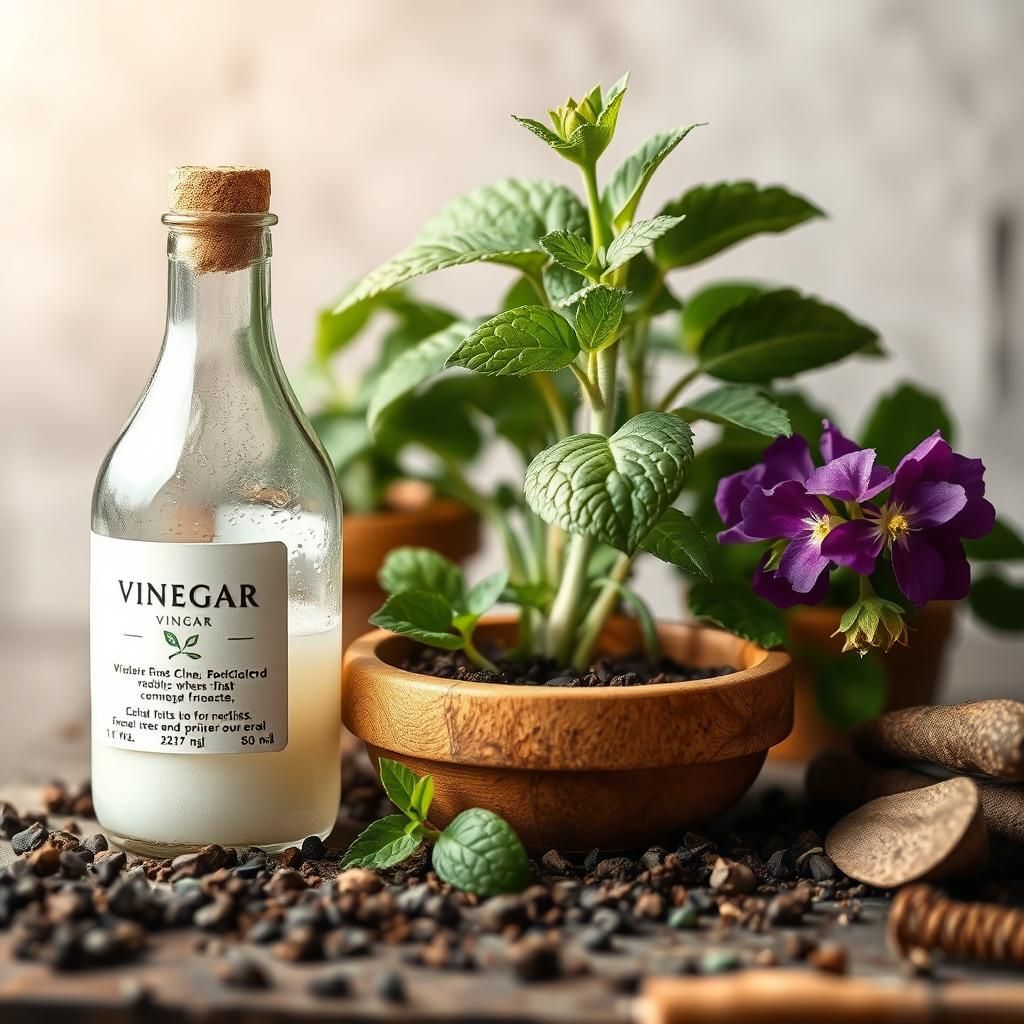What Does Vinegar Do to Plants? Exploring Benefits and Risks for Your Garden

Vinegar is a common household item with diverse applications, ranging from culinary uses to household cleaning. However, its effects on plants can be both beneficial and detrimental, making it a topic of interest for gardeners and plant enthusiasts alike. In this article, we will explore what vinegar does to plants, examining its potential advantages, such as acting as a natural herbicide and pest repellent, as well as the risks it poses to delicate ecosystems. Understanding these effects will help gardeners make informed decisions about incorporating vinegar into their gardening practices for optimal plant health and growth.
Effects of Vinegar on Plants
Vinegar, particularly its active component acetic acid, can have both beneficial and detrimental effects on plants. In small concentrations, vinegar can be used as a natural herbicide, effectively killing unwanted weeds by desiccating them and disrupting their cellular structure. However, when diluted properly, vinegar can also serve as a useful addition to soil by helping to lower the pH levels, thus making the soil more acidic, which can benefit acid-loving plants such as blueberries and azaleas. It is important to apply it carefully and avoid contact with desirable plants as high concentrations can cause leaf burn and damage to roots, negatively impacting their growth.
Vinegar as a Natural Herbicide
Vinegar is often employed as a natural herbicide due to its high acetic acid concentration, which can effectively kill unwanted weeds and invasive plants. The acetic acid in vinegar works by drawing moisture from plant leaves and causing them to wilt and dry out. This method is particularly effective on young, small weeds, as they have less developed root systems and are more susceptible to the effects of vinegar. When using vinegar as a herbicide, it is essential to spray it directly on the foliage and avoid desirable plants, as the acidic nature can lead to unintentional damage.
Impact on Soil pH
Diluted vinegar can be used to adjust the pH of soil, making it more acidic, which is beneficial for certain plants that thrive in lower pH conditions. Acid-loving plants such as rhododendrons, azaleas, and blueberries prefer a more acidic environment, often thriving in soils with a pH below 6. By adding diluted vinegar to the soil, gardeners can help create a more suitable habitat for these species, enhancing their nutrient uptake and promoting overall plant health. However, caution is necessary to ensure that the vinegar is adequately diluted to prevent damage from excessive acidity.
Benefits for Houseplants
Houseplants can also benefit from the occasional application of diluted vinegar in the soil, particularly if the water used for irrigation is hard or alkaline. This can help balance the soil's pH, allowing plants to absorb nutrients more effectively. Additionally, the application can deter certain pests and fungal issues, offering a natural alternative to chemical treatments. However, houseplant owners should use vinegar sparingly; too much vinegar can lead to root damage and hinder plant growth, so it's important to observe the plants' reactions to any treatment applied.
See also:
Risks of Vinegar Application
While vinegar has several potential benefits, it also poses risks, particularly if used inappropriately. Concentrated vinegar can cause significant damage to leaves and roots of many plants, resulting in wilting, browning, or even death. Applying vinegar directly on the leaves of desirable plants or over-application in the soil can lead to harmful effects, so understanding the proper usage and dilution ratios is critical to prevent harming beneficial plants in the garden. Responsible application is essential to harness the benefits without causing injury.
Vinegar and Pest Control
Vinegar can serve as a deterrent against specific pests, such as aphids and mites. By creating a mixture of vinegar and water, gardeners can spray it directly onto the affected plants to repel these unwanted guests. The strong smell and acidic nature of vinegar can disrupt the sensory perception of insects, making the plants less attractive to them. However, it's crucial to test the solution on a small area of the plant first to ensure that the vinegar does not irritate or harm the foliage before applying it widely.
| Benefit/Risk | Details |
|---|---|
| Natural Herbicide | Effective against weeds, draws moisture from leaves. |
| Soil pH Adjustment | Helps acid-loving plants thrive by lowering pH. |
| Houseplant Benefits | Balances pH, can deter pests and fungi. |
| Risks of Damage | Can cause leaf burn or root damage if not diluted. |
| Pest Deterrent | Can repel insects like aphids and mites. |
Understanding the Chemical Reactions of Vinegar in Soil
Vinegar, primarily composed of acetic acid, can significantly impact the soil chemistry and the health of various plants. When applied to the soil, vinegar can alter the pH levels, making it more acidic. This can be beneficial for acid-loving plants, such as blueberries and azaleas, which thrive in lower pH levels. However, excessive use can lead to nutrient depletion, negatively affecting soil microorganisms and eventually harming the roots of plants. Careful application and dilution are crucial to ensuring that the benefits of vinegar do not outweigh its potential risks to garden health.
The Role of Acidity in Plant Growth
Acidity, or pH, plays a vital role in plant growth, affecting nutrient availability and the overall health of the soil. Vinegar’s acidic nature can help lower the pH of alkaline soils, making nutrients like phosphorus and potassium more available to plants. However, if soil acidity becomes too high, it can lead to nutrient lockout, where essential nutrients become unavailable, hindering plant development. Thus, moderation and careful monitoring of pH levels are critical when using vinegar in gardening.
Use of Vinegar as a Weed Killer
Vinegar is commonly used as a natural herbicide due to its high acetic acid content, which can effectively kill unwanted weeds. When sprayed directly onto the leaves of weeds, vinegar can cause cell dehydration, leading to wilting and death. However, while vinegar may eliminate some plants, it can also affect nearby desirable plants if not applied carefully, emphasizing the importance of targeted application and dilution to minimize collateral damage in the garden.
See also:
Benefits of Vinegar as a Fertilizer
Some gardeners incorporate vinegar into their routines as an unconventional fertilizer, particularly for certain acid-loving plants. The acetic acid in vinegar can enhance the microbial activity in the soil, which in turn helps release nutrients that plants need. Additionally, vinegar can help suppress pathogens in the soil, promoting healthier root systems. However, relying solely on vinegar for fertilization without a balanced approach may lead to imbalances in soil nutrition over time.
Risks of Overusing Vinegar in Gardening
While vinegar can offer specific benefits, the risks of overuse in gardening cannot be ignored. Excessive application may lead to soil that becomes too acidic, harming beneficial microorganisms and disrupting the natural ecosystem. Moreover, high concentrations of acetic acid can cause root burn in plants, leading to stunted growth or even death. Therefore, it is essential to approach vinegar use with caution and adhere to proper dilution ratios.
Alternative Uses of Vinegar in Plant Care
Beyond its role in altering soil properties, vinegar has several alternative uses in plant care. For instance, it can be an effective remedy for fungal diseases, helping to control powdery mildew and other common plant ailments. The solution may also be used to clean gardening tools, thereby reducing the risk of spreading diseases. However, gardeners should consider the concentration of vinegar used, as overly strong solutions may damage plants, highlighting the need for safe and responsible application techniques.
Questions from Our Readers
What does vinegar do to plants?
Vinegar, particularly white vinegar, can act as a natural herbicide when applied to unwanted plants or weeds. Its acidity can cause damage to the plant's tissue, leading to wilting or death. However, care should be taken as it can also harm desired plants if applied directly.
Can vinegar be used to promote plant growth?
No, vinegar should not be used to promote plant growth. Its high level of acidity can disrupt the pH balance of the soil, making it less suitable for most plants. Instead, vinegar is typically used for its herbicidal properties rather than as a growth enhancer.
See also:
Is vinegar safe for all types of plants?
No, vinegar is not safe for all types of plants. While it can effectively eliminate weeds, it can also damage delicate plants and crops if not applied carefully. It’s important to apply vinegar selectively and to avoid contact with desirable plants.
How should vinegar be applied to plants?
Vinegar should be applied directly to the foliage of unwanted plants, ideally on a sunny day to enhance its effectiveness. A spray bottle can be used for controlled application, ensuring that desired plants are protected from exposure to the vinegar's acidity.

If you want to read more articles like What Does Vinegar Do to Plants? Exploring Benefits and Risks for Your Garden, we recommend you check out our Plants category.
Leave a Reply
Related Articles